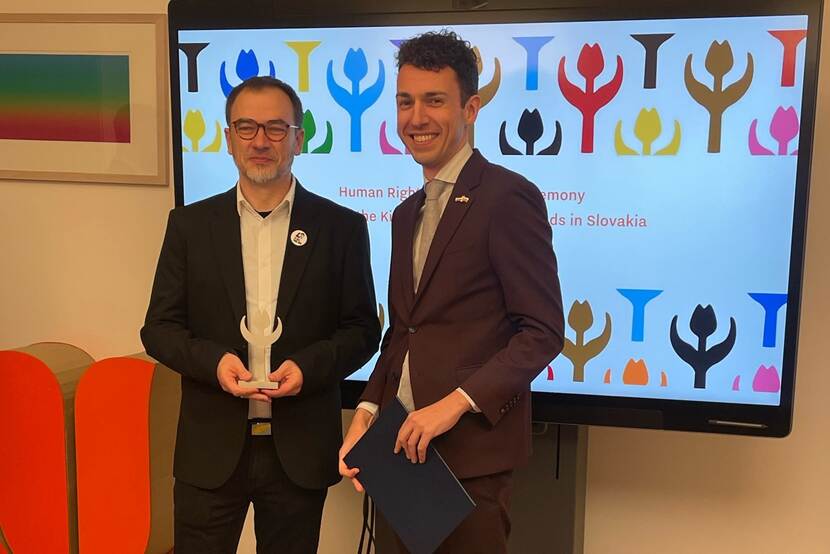Human rights Tulips presented at 24 Dutch embassies worldwide
Weblogs
December 10 was International Human Rights Day. The Netherlands then reflects on the importance of human rights worldwide. Around that day, the Embassy Human Rights Tulip was presented at 24 Dutch embassies to activists who stand up for, for example, the rights of women and girls, LGBTIQ+ or other human rights issues.
This year, twenty-four Dutch embassies awarded a so-called Embassy Tulip to a human rights defender or organisation from their own country. This award aims to provide support and visibility to human rights defenders who promote human rights in a peaceful and innovative way.
24 Embassy Tulips will be awarded in all regions of the world. This also includes the five candidates nominated for the 'central' Human Rights Tulip. The winner of the Embassy Tulip wins an Embassy Tulip statue and prize money. This prize money is intended to be used for a project to promote the human rights work of human rights defenders.
Read about the winners of the Embassy Tulip in Burundi, Colombia, Guatemala, Mexico and Slovakia.
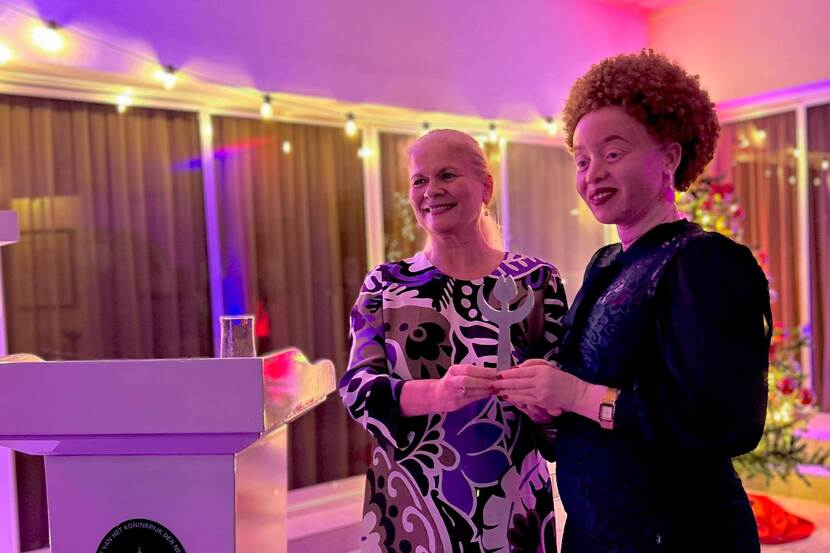
Constance Katihabwa - Burundi
In Burundi the Tulip was awarded to Constance Katihabwa, a 33-year-old Burundian woman, social justice activist, and a powerful advocate for human rights. Living with albinism, Constance has experienced the harsh realities that people like her face in Burundi Her passion for social justice, gender equality, and the rights of people with disabilities is rooted in her own childhood struggles. Determined to make a difference, she pursued a law degree and went on to found ‘Live Together as Family’, an organisation dedicated to advocating for the inclusion of people with albinism in Burundian society.
Through her organisation, Constance raises awareness about the many challenges people with albinism face, particularly in rural areas outside of the economic capital, Bujumbura, where ignorance about disabilities remains widespread.
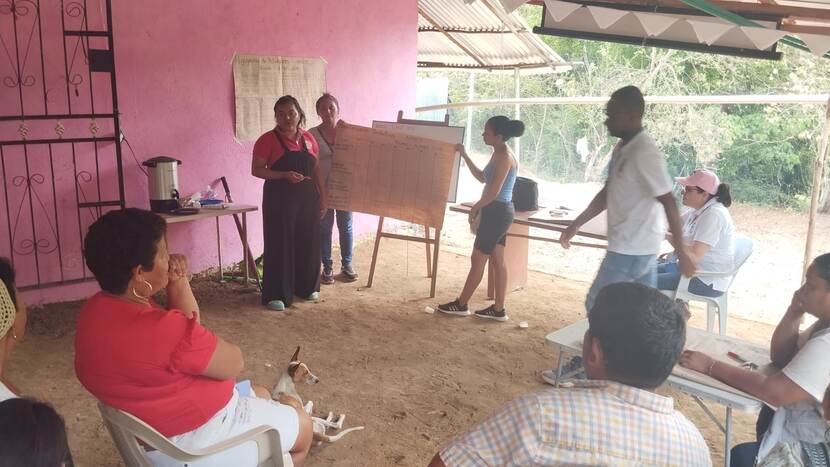
Amusi - Colombia
In Colombia, Dutch ambassador Reina Buijs granted the Human Rights Tulip award to the women’s organization AMUSI. This organization is based in the municipality of Carmen de Bolivar in the north of Colombia, a region that has been highly affected for decades by the armed conflict.
AMUSI promotes the participation of women in social and economic development, access to land, peace building and transitional justice processes. With the funds granted by the award, AMUSI will build a House of Memory that will enable the community to remember what has happened, to talk about their pain but also about their dreams and plans for the future.
The Investigative Center of Ján Kuciak - Slovakia
The Dutch embassy in Slovakia awarded the Tulip to the Investigative Center of Ján Kuciak (ICJK). This Center was established as a not for profit civic organisation in 2018, after the murder of Slovak investigative journalist Ján Kuciak and his fiancée Martina Kušnírová. The main goal of ICJK is to continue in the legacy and work of Ján Kuciak.
ICJK implements domestic and cross-border investigative projects, is involved in the protection of journalists in general and participates in the education of aspiring investigative journalists. Its main objectives are to provide a platform for investigative journalists, to coordinate cooperation between newsrooms, to continue the legacy and work of investigative journalist Ján Kuciak, to protect human rights, and to support education.
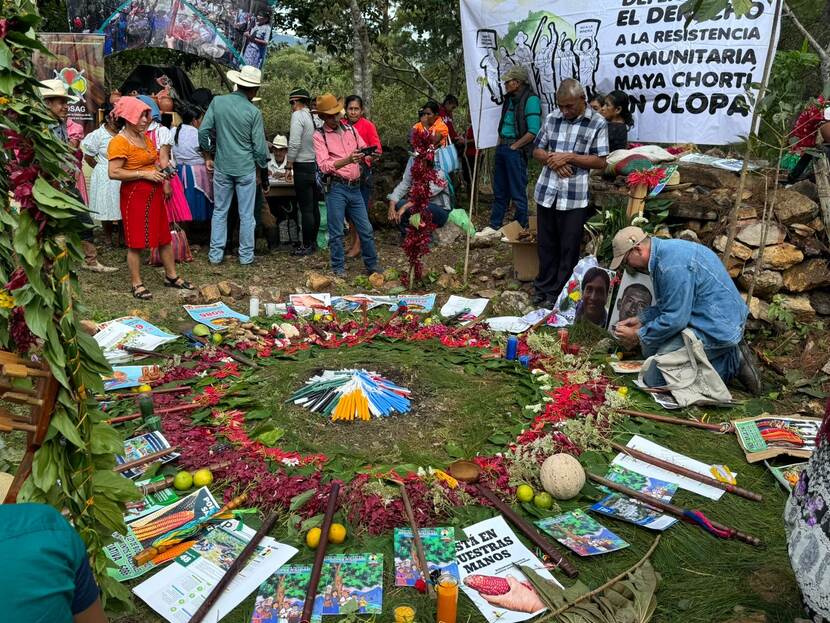
Guatemala – Ch'orti' Maya Indigenous Council of Olopa
In Guatemala the Tulip was awarded to the Ch'orti' Maya Indigenous Council of Olopa as a key organisation in the defense of the rights of indigenous communities and the protection of their territories. The Ch'orti' Maya Indigenous Council of Olopa is a resistance organisation against mining mega-projects, which has made significant progress, such as obtaining protection from the Cantera los Manantiales mine.
At the international level, this case was accepted by the Inter-American Commission on Human Rights; a victory that strengthens the legitimacy of their demands and opens up even more space for other communities. Furthermore, in the context of the 2023 National Strike, the Council has taken on a fundamental role by leading and participating in demonstrations to defend democracy and demand respect for the will of the people of Guatemala.
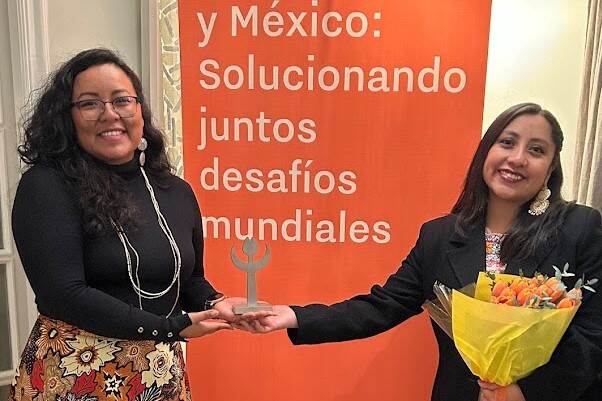
Mexico – Mano Vuelta
Mano Vuelta is the winning organization of the Human Rights Tulip award in Mexico. The organization works on providing indigenous and Afro-Mexican girls and women with comprehensive sexual education and information about their reproductive rights. They do this through innovative means, such as digital educational materials in 6 different indigenous languages.
Moreover, they work on closing the gap between government and local populations. They do this, for example, through writing a policy brief on sexual and reproductive rights of marginalized indigenous and Afro-Mexican groups for the government of the state in which they work, Oaxaca. This work is extremely important in the Mexican context, since indigenous and Afro-Mexican populations are more invisible and harder to reach for the federal government.
Safety
Embassies will organise the award ceremony at the embassy or another location in the country on or around December 10, International Human Rights Day. Naturally, great care is always taken to ensure that the publicity does not endanger the safety of the winner.
The Dutch Ministry of Foreign Affairs also awards a central Human Rights Tulip to human rights defenders every year, to support them in the work they do. With the central Human Rights Tulip, the Netherlands offers recognition and visibility to the winners and emphasises the legitimacy and importance of their work as human rights defenders. This year, Minister Veldkamp will announce the winner on December 12 in the Peace Palace in The Hague, the Netherlands.
More blog posts
Leave a comment
Inappropriate comments will be removed. Comments are limited to 2000 characters.
Comments
No comments have been published yet.
